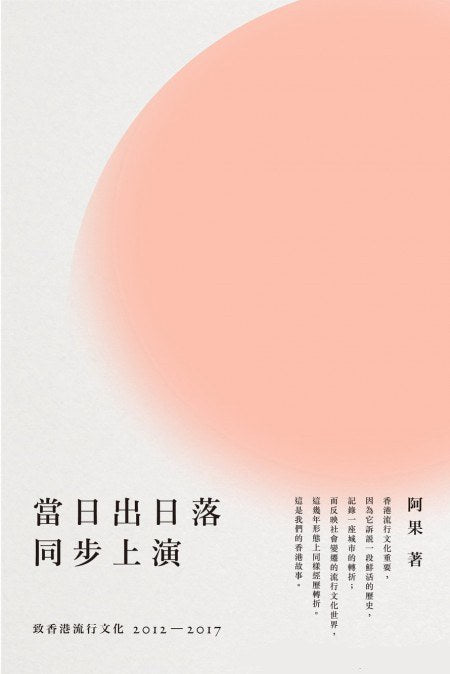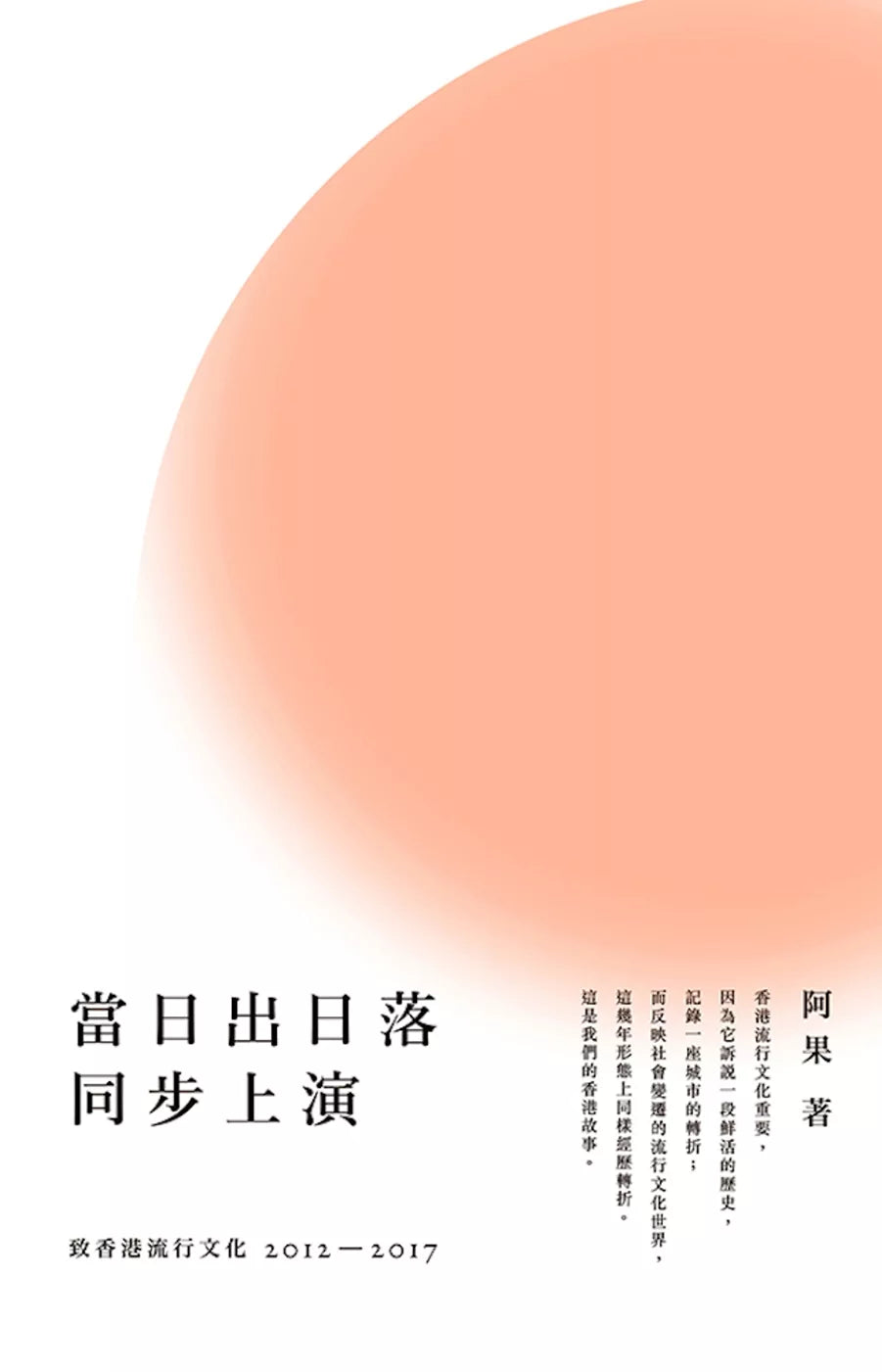1
/
of
2
When the sunrise and sunset occur simultaneously
When the sunrise and sunset occur simultaneously
Aguo
Regular price
$24.99 USD
Regular price
Sale price
$24.99 USD
Unit price
/
per
Low stock
Couldn't load pickup availability
About Book
About Book
For Hong Kong people, the years from 2012 to 2017 were five years that will never be forgotten and will have a profound impact.
We bid farewell to Tsang Sin-kuen and welcomed Leung Chun-ying, and then to Carrie Lam; we experienced several major social movements, opposing national education, demanding television, calling for the Chief Executive to resign, and even holding up umbrellas - these memories are vivid in our minds.
So, how much do you remember about pop culture during this period? Compared to political events, pop culture was considered secondary—how important was listening to a song or watching a TV series? Why did all this celebrity gossip and these ridiculous shows still deserve so much attention?
"I can't bear to watch TVB anymore!"
"I don't listen to Cantonese song boards!"
"Of course I want XXX, not XXX!"
We're all familiar with these claims. However, when you look at Facebook research data or conduct field research in coffee shops, you'll discover that the real world isn't like that.
"I can't bear to watch TVB anymore!" (But when talking about a certain drama series, everyone can say a few words. The most common sentence I hear is "It's so different from other TVB dramas.")
"I don't listen to Cantonese songs anymore!" (But when a certain singer took the stage at an awards ceremony, the whole of Facebook was sharing/commenting.)
This is the power of pop culture.
More importantly, do we think that popular culture exists independently of the overall social climate and environment? I'm afraid not.
Whatever TV stations we have and what programs we watch are essentially all politics (which we detest). Consequently, the much-maligned major TV stations continue to dominate, while those with reformist ambitions and substantial investment are denied licenses.
Looking back at the major pop culture events of the past few years, we see the story of Hong Kong. When we thought things were at their most difficult, some people and some things quietly emerged. These past few years have been a time of both sunrise and sunset, and a turning point for us.
About the Author:
Ah Guo, the author of the "Fruit Column" of "Ming Pao Sunday Life", likes pop culture, is close to mass media, and cares about social politics. He is the author of "Ten Years: A Chronicle of Hong Kong Popularity (2000-2010)", and his articles can also be found in "Standpoint News", "Extra", etc.
We bid farewell to Tsang Sin-kuen and welcomed Leung Chun-ying, and then to Carrie Lam; we experienced several major social movements, opposing national education, demanding television, calling for the Chief Executive to resign, and even holding up umbrellas - these memories are vivid in our minds.
So, how much do you remember about pop culture during this period? Compared to political events, pop culture was considered secondary—how important was listening to a song or watching a TV series? Why did all this celebrity gossip and these ridiculous shows still deserve so much attention?
"I can't bear to watch TVB anymore!"
"I don't listen to Cantonese song boards!"
"Of course I want XXX, not XXX!"
We're all familiar with these claims. However, when you look at Facebook research data or conduct field research in coffee shops, you'll discover that the real world isn't like that.
"I can't bear to watch TVB anymore!" (But when talking about a certain drama series, everyone can say a few words. The most common sentence I hear is "It's so different from other TVB dramas.")
"I don't listen to Cantonese songs anymore!" (But when a certain singer took the stage at an awards ceremony, the whole of Facebook was sharing/commenting.)
This is the power of pop culture.
More importantly, do we think that popular culture exists independently of the overall social climate and environment? I'm afraid not.
Whatever TV stations we have and what programs we watch are essentially all politics (which we detest). Consequently, the much-maligned major TV stations continue to dominate, while those with reformist ambitions and substantial investment are denied licenses.
Looking back at the major pop culture events of the past few years, we see the story of Hong Kong. When we thought things were at their most difficult, some people and some things quietly emerged. These past few years have been a time of both sunrise and sunset, and a turning point for us.
About the Author:
Ah Guo, the author of the "Fruit Column" of "Ming Pao Sunday Life", likes pop culture, is close to mass media, and cares about social politics. He is the author of "Ten Years: A Chronicle of Hong Kong Popularity (2000-2010)", and his articles can also be found in "Standpoint News", "Extra", etc.
Publication Date
Publication Date
2018-05-01
Publisher
Publisher
突破出版社
Imprint
Imprint
Pages
Pages
312
ISBN
ISBN
9789888392728
share



